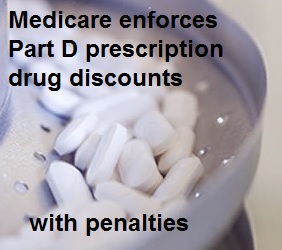The Affordable Care Act set in motion a series of reforms to slowly close the coverage gap or “donut hole” that Part D members faced after they met their initial coverage dollar amount. Pharmaceutical manufacturers that wanted their Brand name drugs covered in the gap had to sign an agreement with Medicare to cover 50% of the cost of the drug. Medicare has had to assess civil monetary penalties on many companies that failed to cover the discount.
How does the coverage gap discount work for brand-name drugs?
Companies that make brand-name prescription drugs must sign agreements with Medicare to participate in the Medicare Coverage Gap Discount Program. This program requires the companies to offer discounts on brand-name drugs to people who have reached the coverage gap. These discounts, along with increased coverage in the coverage gap, mean that once you reach the coverage gap in 2013 and 2014, you’ll pay 47.5% of the plan’s cost for covered brand-name prescription drugs. You get these savings if you buy your prescriptions at a pharmacy or order them through the mail. The discount will come off of the price that your plan has set with the pharmacy for that specific drug. – Closing the Coverage Gap
Enforcement Actions against Pharmaceutical Manufacturers Participating in the Coverage Gap Discount Program
Under the Medicare Coverage Gap Discount Program (Discount Program), CMS imposes civil monetary penalties (CMPs) on participating manufacturers that fail to pay applicable discounts as required. Section 1860D-14A(e)(2) of the Affordable Care Act and section IV of the Discount Program Agreement require CMS to impose a civil monetary penalty (CMP) on a participating manufacturer that fails to provide applicable discounts in accordance with the Discount Program Agreement. The CMP is equal to the sum of the applicable discount payments that the manufacturer fails to provide plus 25% of such amount. – Pharmaceutical Manufacturer Enforcement Actions
Who’s been penalized?
Since the beginning of 2013 there have been 17 enforcement actions against drug makers.
| Company | Date | Penalty |
| Lehigh Valley Technologies, Inc | 14-Feb | $375.76 |
| West-Ward Pharmaceuticals | 14-Feb | $101.83 |
| QLT Ophthalmics, Inc. | 14-Feb | $64.14 |
| DUSA Pharmaceuticals, Inc | 14-Feb | $21.47 |
| Angelini Pharma Inc. (Labopharm) | 18-Apr | $1,874.45 |
| Legacy Pharmaceuticals Puerto Rico | 18-Apr | $942.16 |
| QLT Ophthalmics, Inc. | 18-Apr | $2,906.53 |
| Ferring Pharmaceuticals Inc. | 18-Apr | $2,906.48 |
| Actavis Kadian, LLC | 18-Apr | $116,702.56 |
| Fougera Pharmaceuticals | 18-Apr | $73,605.43 |
| InterMune, Inc. | 18-Apr | $3,965.15 |
| BioMarin Pharmaceutical | 18-Apr | $918.71 |
| B. Braun Medical Inc. | 18-Apr | $610.69 |
| West-Ward Pharmaceuticals | 27-Jun | $298.31 |
| InterMune, Inc. | 27-Jun | $5,641.28 |
| BioMarin Pharmaceutical | 27-Jun | $1,723.72 |
| B. Braun Medical Inc. | 27-Apr | $1,344.97 |
Is this good compliance with the Medicare Agreement?
It’s interesting that most of the penalties are rather small, less than $5,000, possibly indicating simple accounting problems at the manufacturer or third party pharmacy benefits management level. The largest penalty of $116,702.56 went to Actavis Kadian, LLC which, in their words –
Actavis Specialty Brands focuses primarily on the development and commercialization of branded pharmaceuticals within the Urology and Women’s Health therapeutic categories.
Actavis Specialty Brands currently markets more than 40 brand products in the U.S., and is focused growing and expanding its Specialty Brands business globally.
In Canada, in 2012, Actavis launched and currently markets Rapaflo®, Gelnique®, Androderm®, and Oxytrol®, and has deployed a sales force of 24 representatives calling on urologists and primary care physicians to detail these products.
Drug companies usually in compliance
It is important to note that these penalties are not related to the efficacy of the pharmaceuticals, but the manufacturer’s agreement to discount Brand name drugs to members of Part D plans who reach the coverage gap. It is nice to see that Medicare is actively working to enforce Part D agreements within the Affordable Care Act to keep prescription drug cost low for Medicare beneficiaries.
Medicare maintains a web page detailing the program for pharmaceutical manufactures where all the instructions for reimbursement and agreements are located.
Part D Information for Pharmaceutical Manufacturers
This page provides important information related to Part D program for Pharmaceutical companies.
The Medicare Coverage Gap Discount Program (Discount Program) makes manufacturer discounts available to eligible Medicare beneficiaries receiving applicable, covered Part D drugs, while in the coverage gap. In order to participate in the Discount Program, manufacturers must sign an agreement with CMS to provide the discount on all of its applicable drugs (i.e. prescription drugs approved or licensed under new drug applications or biologic license applications). Beginning in 2011, only those applicable drugs that are covered under a signed manufacturer agreement with CMS will be covered under Part D.
